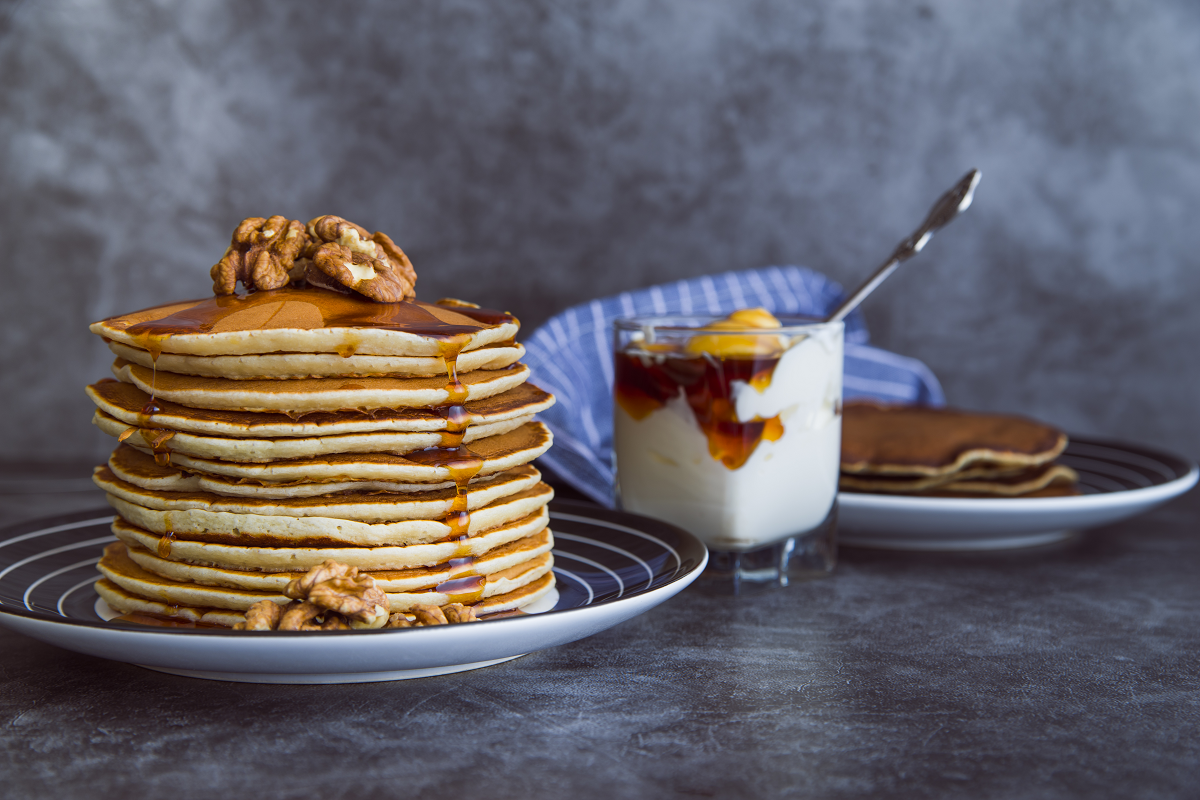
Introduction to the Article:
When whipping up a batch of pancakes, have you ever paused to wonder, do buckwheat pancakes have carbs? Buckwheat, often hailed as a powerhouse of nutrients, takes center stage in this exploration. This article delves into the carbohydrate content of buckwheat pancakes, contrasting them with other types, and unfolds the myriad benefits that buckwheat brings to the breakfast table. From nutritional insights to tasty recipes, we cover it all, ensuring you can make informed choices about your morning delights.
Introduction to Buckwheat Pancakes
What are Buckwheat Pancakes?
First off, let’s get a handle on what buckwheat pancakes really are. Contrary to what the name suggests, buckwheat isn’t a type of wheat. No, it’s a seed from a fruit that’s connected to rhubarb and sorrel. So, it’s a fantastic choice for folks who steer clear of gluten.
Buckwheat pancakes are made from buckwheat flour, which gives them a distinctive, slightly nutty taste. Not only are they a hit for those seeking a gluten-free option, but they’re also praised for their nutritional benefits.
Overview of Buckwheat as an Ingredient
Buckwheat has been a staple in diets around the world, particularly in Russia and China, where it’s been enjoyed for centuries. It’s renowned not just for its taste but also for its nutritional prowess. Buckwheat groats, the hulled seeds of the plant, are loaded with essential nutrients.
These pancakes are more than just tasty; they’re a fiber-rich, nutritious option that can fit beautifully into a variety of dietary needs. They have a low glycemic index, which means they help maintain blood sugar levels, making them an ideal choice for those monitoring their glucose intake. Additionally, buckwheat is a good source of antioxidants, with studies suggesting it can contribute to heart health and overall wellness.
So, when you ask, do buckwheat pancakes have carbs, remember they bring a lot more to the table, offering a host of health benefits while still fitting into a balanced diet. In the next part, we’ll dive deeper into the macronutrients of buckwheat pancakes and see how they stack up against other popular breakfast choices. Stay tuned!
Macronutrients in Buckwheat Pancakes
Carbohydrates Content
Let’s cut to the chase—yes, buckwheat pancakes do contain carbs, but it’s the type and quantity that might surprise you. A typical serving of buckwheat pancakes contains a moderate amount of carbs, primarily complex carbohydrates, which are a stellar source of sustained energy. This is due to buckwheat’s composition, primarily made up of starch, a slow-releasing form of energy that keeps you fueled through the morning.
Protein and Fat Content
Besides carbs, buckwheat pancakes offer a modest amount of protein, making them a more balanced meal choice. The protein in buckwheat is high-quality, containing all eight essential amino acids, which are crucial for body repair and growth. The fat content, meanwhile, is relatively low but includes some healthy fats that contribute to satiety and flavor.
Comparison with Other Pancakes
Now, here’s the scoop: when compared to traditional wheat-based pancakes, buckwheat pancakes generally have fewer carbohydrates and a lower calorie count—talk about a win-win for those watching their waistline or managing their carb intake! Moreover, they have a higher protein and fiber content, which not only helps in managing hunger but also supports digestive health.
In essence, buckwheat pancakes aren’t just about keeping carbs in check; they’re about offering a nutritious, balanced option that caters to a variety of dietary needs. Whether you’re looking to maintain blood sugar levels or seeking a hearty, healthful start to your day, they fit the bill perfectly. Plus, they’re a delightful way to add variety to your diet while reaping the benefits of whole grains. Next, we’ll explore the vast health benefits of buckwheat, which make it such a superfood in the world of pancakes and beyond. Stay tuned for more delicious details!
Buckwheat Benefits and Dietary Considerations
Health Benefits of Buckwheat
Diving into the health benefits, buckwheat is a true nutritional champion. It’s rich in minerals like magnesium, copper, and manganese—essential elements that play a crucial role in bone health and maintaining blood sugar levels. Additionally, buckwheat is a fantastic source of dietary fiber, which is great for digestive health and has been linked to lowering cholesterol levels.
But that’s not all—buckwheat is also packed with antioxidants, including rutin, quercetin, and D-chiro-inositol. These powerful compounds are known for their ability to combat inflammation and enhance heart health. So, incorporating buckwheat pancakes into your diet isn’t just a tasty choice but a heart-smart one too!
Dietary Considerations
For those with dietary restrictions, buckwheat pancakes are a godsend. Firstly, they are naturally gluten-free, making them a safe and delicious option for individuals with celiac disease or gluten sensitivity. It’s a comforting thought that you can enjoy a stack of fluffy pancakes without the worry of gluten.
Moreover, buckwheat is low on the glycemic index, which makes these pancakes an excellent choice for people managing diabetes. They provide a steady release of energy, preventing the spikes in blood sugar that are common with other high-carb meals.
However, it’s important to note that while buckwheat is generally safe and beneficial, some individuals might have allergies to buckwheat. Although rare, buckwheat allergies can occur, especially in those who are sensitive to other seeds. As always, it’s wise to consult with a healthcare provider if you’re introducing a new food into your diet, particularly if you have food allergies.
In summary, buckwheat pancakes not only offer a delicious alternative to traditional pancakes but also boast a plethora of health benefits. They’re a fantastic addition to any meal plan, providing essential nutrients while catering to a range of dietary needs. Up next, we’ll whip up some tips on how to prepare buckwheat pancakes that are light, fluffy, and downright irresistible. Stay tuned for some scrumptious recipes and handy cooking tips!
Preparing Buckwheat Pancakes
Basic Recipe for Buckwheat Pancakes
Starting your day with buckwheat pancakes is easier than you might think. Here’s a simple recipe to get you flipping those wholesome pancakes in no time:
- Ingredients:
- 1 cup buckwheat flour
- 1 tablespoon sugar (optional)
- 1 teaspoon baking powder
- 1/2 teaspoon salt
- 1 egg, beaten
- 1 cup milk (dairy or any plant-based alternative)
- 2 tablespoons melted butter or oil
- Instructions:
- In a large bowl, combine the buckwheat flour, sugar, baking powder, and salt.
- Whisk the beaten egg, milk, and melted butter in another bowl.
- Mix the wet ingredients into the dry ones, stirring only until they are combined. Let the batter rest for a few minutes to allow it to thicken.
- Warm a non-stick skillet or griddle over medium heat and lightly coat it with butter or oil.
- Pour roughly a quarter cup of batter into each pancake. Cook until bubbles start to form on the surface and the edges seem firm, then flip and cook until the other side turns golden brown.
Voila! Serve these fluffy buckwheat pancakes with your favorite toppings—perhaps a drizzle of maple syrup, a scoop of fresh berries, or even a dollop of yogurt for an extra touch of creaminess.
Tips for Making Fluffy Buckwheat Pancakes
- Don’t Overmix: Keep the batter lumpy. Overmixing will make your pancakes tough and chewy.
- Rest the Batter: Allowing the batter to rest for a few minutes before cooking helps the baking powder activate, giving you fluffier pancakes.
- Proper Heat: Ensure your griddle or skillet is at the right temperature—too hot, and the pancakes will burn; too cool, and they won’t cook through.
Variations in Recipes
Buckwheat pancakes are wonderfully versatile. Here are a few variations to spice up your breakfast:
- Vegan Buckwheat Pancakes: Substitute the egg with a flax egg and use plant-based milk and oil instead of butter.
- Added Flavors: Mix cinnamon, vanilla extract, or even a pinch of nutmeg into the batter to enhance the flavor.
- Extra Nutrients: Add a handful of blueberries, chopped nuts, or seeds to the batter for added texture and nutrition.
Exploring different tweaks to the basic recipe can lead to delightful discoveries that make breakfast exciting again. In our next section, we’ll compare buckwheat pancakes to other popular types and see just how they stack up in terms of nutritional value. Stay tuned for an enlightening comparison!
Comparison with Other Types of Pancakes
Nutritional Differences (Carbs, Calories)
When we stack buckwheat pancakes against their more traditional counterparts made from plain white flour, the differences can be quite eye-opening. Generally, buckwheat pancakes tend to have fewer calories and carbohydrates. This makes them a smarter choice for those monitoring their calorie intake or managing conditions like diabetes, where carb control is essential.
Buckwheat itself is a powerhouse of nutrients. It’s higher in fiber and protein compared to white flour, which means buckwheat pancakes can keep you fuller longer. This satiety factor is not just beneficial for weight management but also helps maintain steady energy levels throughout the day.
Taste and Texture Comparisons
Now, let’s talk about taste and texture—because let’s face it, no one wants to compromise on flavor! Buckwheat pancakes have a distinctively rich and earthy flavor, which is quite different from the more neutral taste of traditional pancakes. They also boast a heartier texture, which pairs beautifully with both sweet and savory toppings.
For those who enjoy a lighter, fluffier pancake, tweaking the amount of baking powder or letting the batter rest can make a big difference. However, if you’re open to exploring new textures and flavors, buckwheat pancakes might just become your new favorite breakfast option.
In essence, while buckwheat pancakes provide a nutritious alternative to traditional pancakes, they also offer a unique taste experience that can bring a delightful twist to your morning routine. Whether you’re looking for a healthier option or simply want to try something new, buckwheat pancakes are definitely worth flipping for.
Conclusion
In wrapping up our exploration of buckwheat pancakes, it’s clear that they’re more than just a delicious breakfast option—they’re a smart choice for anyone looking to improve their diet. Whether you’re gluten-intolerant, watching your blood sugar, or simply striving for a healthier lifestyle, buckwheat pancakes offer a nutrient-packed alternative that doesn’t skimp on flavor or satisfaction.
Moreover, the versatility of buckwheat pancakes makes them a delightful addition to any meal plan. Experiment with different recipes and toppings to keep your morning meals exciting and nutritious. Embracing buckwheat pancakes could very well be your first step towards a healthier, more balanced diet, proving that good health and great taste can indeed go hand in hand.
Remember, the benefits of integrating buckwheat into your diet extend beyond just the breakfast table. As a versatile grain, buckwheat can also be incorporated into a variety of dishes, from hearty stews to sweet desserts, broadening your culinary horizons. So, as you savor each bite of your buckwheat pancake, know that you are nourishing your body with one of nature’s hidden treasures. Let these fluffy delights be a testament to how nutritious eating can also be utterly delicious.
FAQs on Buckwheat Pancakes
Is buckwheat high in carbs?
While buckwheat does contain carbohydrates, it is important to note that these are mostly complex carbohydrates, which have a more gradual impact on blood sugar levels compared to simple carbs. A typical serving of cooked buckwheat groats contains about 20 grams of carbohydrates. This makes buckwheat a reasonable option for those who are mindful of their carb intake, particularly because it also offers a high level of nutrients and dietary fiber.
Are pancakes high in carbs?
The carbohydrate content in pancakes can vary significantly depending on the ingredients used. Traditional pancakes made from refined wheat flour are typically high in carbs, with a standard serving containing around 30 to 45 grams of carbohydrates. However, pancakes made with alternative flours like buckwheat are often lower in carbs and provide a more balanced nutrient profile, making them a preferable option for those managing their carbohydrate intake.
How many calories are in buckwheat pancakes?
The calorie content of buckwheat pancakes can differ based on the recipe and the size of the pancakes. On average, a medium-sized buckwheat pancake might contain between 70 to 100 calories. This calorie range makes them a relatively low-calorie option compared to many other types of pancakes, especially when minimal sugar and healthy toppings are used.
Why are buckwheat pancakes good for you?
Buckwheat pancakes offer several health benefits that make them a valuable addition to a balanced diet. Here’s why they benefit you:
- Nutrient Density: Buckwheat is rich in essential minerals like magnesium, phosphorus, and iron. It is also a good source of B vitamins, which are vital for energy metabolism.
- Heart Health: The high fiber content in buckwheat helps to reduce cholesterol levels, which is beneficial for heart health. Additionally, buckwheat contains antioxidants like rutin, which can improve circulation and prevent blood clotting.
- Blood Sugar Control: Because buckwheat has a low glycemic index, it does not cause rapid spikes in blood sugar levels. This makes buckwheat pancakes a great option for people with diabetes or those trying to manage their blood sugar levels.
- Gluten-Free: For those with celiac disease or gluten sensitivity, buckwheat pancakes are an excellent choice as buckwheat does not contain gluten.
- Satiety: The combination of protein, fiber, and complex carbs in buckwheat pancakes promotes a feeling of fullness, helping to curb appetite and potentially aid in weight management.

